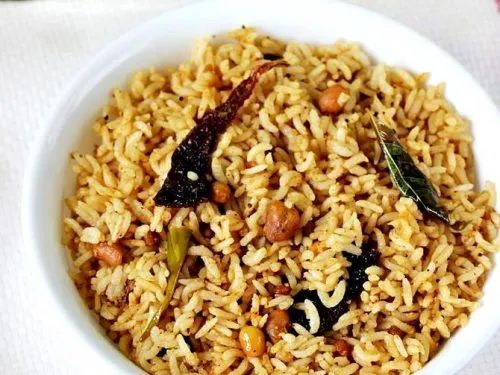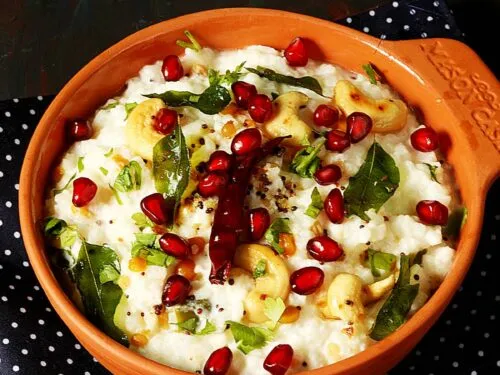Pulihora Recipe
Updated: May 5, 2024, By Swasthi
Pulihora is a popular traditional rice dish from Andhra Cuisine. This dish features precooked white rice that’s mixed with a tempering made with oil, mustard seeds, lentils, curry leaves, chilies, tamarind and other pantry staples. It’s delicious, aromatic, tangy and hot. Chintapandu Pulihora is a staple, specially made during festivals or religious ceremonies and is also offered to the deities.
About Pulihora
It is a tradition in many Telugu speaking Hindu households and temples to offer this to the Gods along with Garelu, Curd Rice, Paramannam (rice payasam) or Chakkara Pongali. It is distributed as prasadam among the families, friends and to the devotees visitng the temples. Similar dishes made in other South Indian states are – Puliyogare from Karnataka and Puliyodarai from Tamil Nadu. But pulihora is much easier than the other versions.
To begin with, cook rice in a way it remains grainy and separated, yet not hard, undercooked or mushy. Traditionally only aged rice is preferred and new rice (rice that is harvested in the current year) is not used. Newly harvested rice turns out softer and kind of sticky so it is not used. Any short grain aged rice is preferred but feel free to use any other aged rice of choice.
Tamarind is the key ingredient and traditionally good quality sour tamarind is used. Make sure it smells and tastes fresh, not metallic. It is soaked in hot water until soft, squeezed well to extract the pulp and strained. I know this seems like a hard work but it is very common for the tamarind to have plenty of debris and tiny bits of hard tamarind coverings/shells. So this step is inevitable if you want the best pulihora. You may try store bought ready to use bottled pulp or concentrate but I have never tried it in this recipe.
Green Chilies, red chilies, ginger, turmeric, curry leaves, hing are the basic ingredients used in the tempering. If making this for an offering omit chilies and ginger and use crushed black pepper instead or simply follow your family’s customs.
The temple style Pulihora uses mustard powder or crushed sesame seeds. If you want you may roast the seeds lightly and crush to use half tsp powder. Using a lot can easily make the dish bitter.
Photo Guide
Step by step Photo Instructions
1. To make mustard powder (optional) – Add mustard seeds to a pan and heat them. Do not roast a lot they may turn bitter. Remove and set aside to cool. or you can also use sesame seeds. Dry roast them in a pan until they begin to splutter. Turn off and cool them. Make a fine powder. Keep this aside.
2. Soaking Tamarind: Rinse and soak tamarind in hot water and make a thick paste by squeezing. Filter to remove stones and debris. Set this aside.

3. Cook rice without making it mushy. I cook rice in a pressure cooker directly for 1 whistle. Spread the rice on a wide plate and sprinkle salt, turmeric and oil.Set aside to cool completely.

4. Add oil to a pan and heat it. Next add mustard, chana dal, urad dal and peanuts. Fry the peanuts till golden & aromatic. Then add curry leaves, ginger, green chilies and red chilies. Fry everything well until the curry leaves turn crisp.

5. Add tamarind paste, jaggery, hing and more salt.Cook until the mixture becomes thick.

5. Switch off the stove when the mixture begins to leave oil on the sides.

6. Sprinkle mustard powder. Then add the pulihora mixture over it. Mix the rice well. Taste test and adjust salt.

Serve Pulihora with a side of Garelu, onion pakoda, masala vada or yogurt.

Related Recipes
Recipe Card

Pulihora Recipe
For best results follow the step-by-step photos above the recipe card
Ingredients (US cup = 240ml )
- 1½ cups aged rice
- 1 tablespoon sesame oil (or any cooking oil)
- ¼ teaspoon Turmeric (adjust to color)
- ½ teaspoon Salt or as needed
- 1 handful tamarind or 4 tbsp. thick tamarind pulp (adjust to suit your taste)
- ½ to 1 teaspoon Jaggery optional
To powder
- ½ teaspoon mustard powder lightly roasted or roasted sesame seeds powder (optional)
To temper
- 2 tablespoons Oil
- ½ teaspoon mustard
- 1 tablespoon urad dal
- 1 tablespoon channa dal
- ¼ cup peanuts
- 2 red chilies broken
- 2 Green chilies slit (if not for naivedyam)
- ½ teaspoon Ginger finely chopped (optional)
- 2 sprigs curry leaves
- 1 pinch hing /asafoetida
Instructions
Preparation
- Cooking rice – Add rice to a bowl & wash it well a few times. Pour 3 cups water. Place the bowl in a pressure cook and cover with a lid. Pressure cook for 2 to 3 whistles on a medium flame. When the pressure drops remove the bowl and transfer to a wide plate. Do not mash it.
- Preparing rice – The rice has to be grainy and not mushy. Sprinkle salt and turmeric over the rice. Then pour 1 tbsp sesame oil. Let cool down and mix well. If needed add more turmeric to get the color you desire.
- Making mustard powder (optional) – If you wish to use mustard powder, roast the seeds until slightly hot and cool. Powder and set aside. or You can roast sesame seeds until they begin to splutter. Cool and powder. Do not use both, use either of them.
- Soaking Tamarind – Add tamarind to a small bowl and rinse it. Pour hot water just enough to immerse it. When it turns soft, squeeze and make a thick paste. Pass it through a filter, discard stones and pulp.
How to make pulihora
- Heat a pan with oil. Add mustard, peanuts, chana dal & urad dal. Fry till the peanuts turn golden & aromatic. Add curry leaves, green chilies, red chilies and ginger (optional). Fry till the red chilies turn crisp
- Add hing, followed by tamarind pulp, jaggery and little more salt.
- Mix everything well & cook till the mixture turns thick & begins to leave the oil on the side. If you take off the mixture a bit early your pulihora will turn very moist & mushy. Turn off the stove.
- The rice must be cool by now. Sprinkle mustard powder or sesame powder all over the rice. Then transfer ¾ of the cooked pulihora mixture to the rice.
- Gently mix and add more if needed. If offering to God do not taste it. Else you can taste and add more salt as needed. If the pulihora is too dry add more oil & mix.
- Serve pulihora with fresh homemade curd.
Notes
- Jaggery enhances the taste without adding too much sweetness to the pulihora. You can also skip it if your tamarind has slight sweet tones.
- Sesame seeds or mustard powder is used in temple style pulihora. You may omit it if you do not like. Use only one of them. Using both may make your dish bitter.
- If making for naivedyam skip chilies & ginger or you may follow your familys’ custom
NUTRITION INFO (estimation only)
© Swasthi’s Recipes
About Swasthi
I’m Swasthi Shreekanth, the recipe developer, food photographer & food writer behind Swasthi’s Recipes. My aim is to help you cook great Indian food with my time-tested recipes. After 2 decades of experience in practical Indian cooking I started this blog to help people cook better & more often at home. Whether you are a novice or an experienced cook I am sure Swasthi’s Recipes will assist you to enhance your cooking skills. More about me
Follow Swasthi’s Recipes








Comments
What to do if the tamarind mixture becomes runny🙄
Boil it separately first until thick and then add to the tempering
Can we use a day old rice kept in the fridge for this?
Yes but first reheat the rice in a cooker until really hot. Cool and use.
Can i make the paste and store it
I cooked pulihora for the first time today. I didn’t add jaggery and the results were awesome. It was almost the same as my friend Paul’s mother cooked me in guntoor. Amazing explainantion…..!!!!
Glad to know! Thank you
Recipe is very good. Liked the taste will make it again.
Glad you liked it Aditi
Thanks for trying
Can the tamarind mixture be stored in refrigerator for a week n mix it when required with rice
Yes usually it keeps good for a month in the fridge. Just ensure you cook it well until oil begins to separate.
Your great
🙂
How much tamarind concentrate if using?
Hi Avanti
I don’t use concentrate so no idea. Just add a tsp of it and check first. Then add more if needed.
Super
I tried it very tasty thank u very much
Good
Hi madam i am Venkanna, first i like to thank you a lot for giving us a great idea regarding tasty and delicious recipes for us. Bachelors like me really learning a lot of things from you and the recipes are really mouth watering for us, we would like see lot more yummy foods from you.
Hello Venakanna
You are welcome
I am very happy to know the recipes are useful.
Yes surely will be sharing more easy & delicious recipes
Thanks for your time to write back here.
Wonderful
Thank you
Difficulty level: 3/5
Very tasty. Thank you
welcome Anusha
I like these recepie a lot… Thank you very much
Welcome Mounika. iam glad you like the recipe
i like this site so much.
Thanks Priya
i like this site & it is amazing too because i don’t know how to cook rice but with u’r help i can make pulihora .
Thanks Sultana. Iam glad you like this site
Garelu resipe is so testy and i love Garelu. It was breakfast
Thanks Sowdhamini. Glad to know you enjoyed garelu
I just love different kinds of poha, I have today spicy version too.
Thank you Swathi garu, not jus this for all your receipe I feel it like the same taste which my mom makes in home when I try for myself. My only burden is the receipe to cook anything and the recipes you share makes my task very easy 😀 .. Though I do for the first time my roomates Just loves to taste them and enjoys food.. Thanks so much for that..
Hello Divya,
You are welcome! So happy to know the recipes are helping you cook! Thank you and stay safe!
I am sure this is delicious! Looks a bit like couscous.